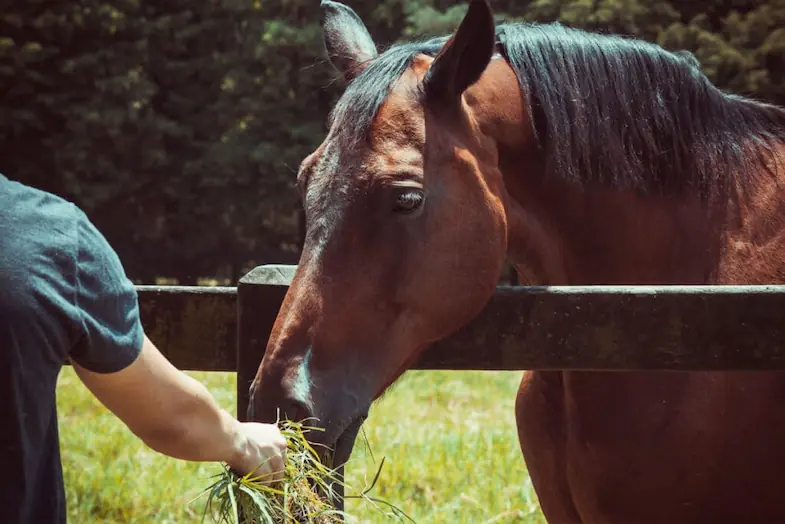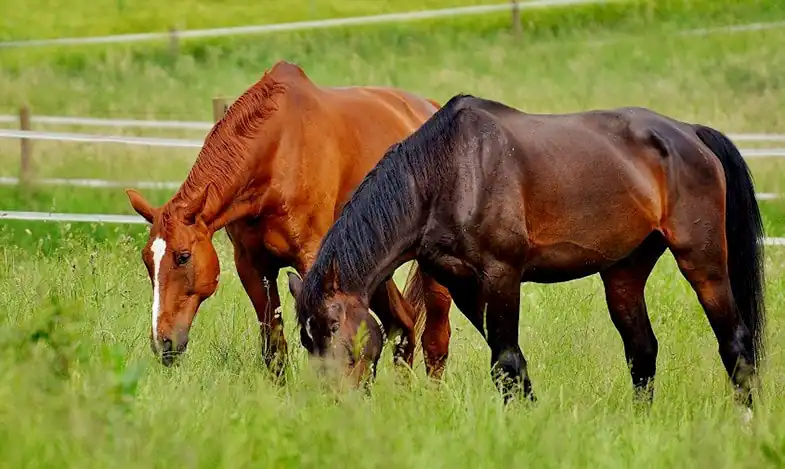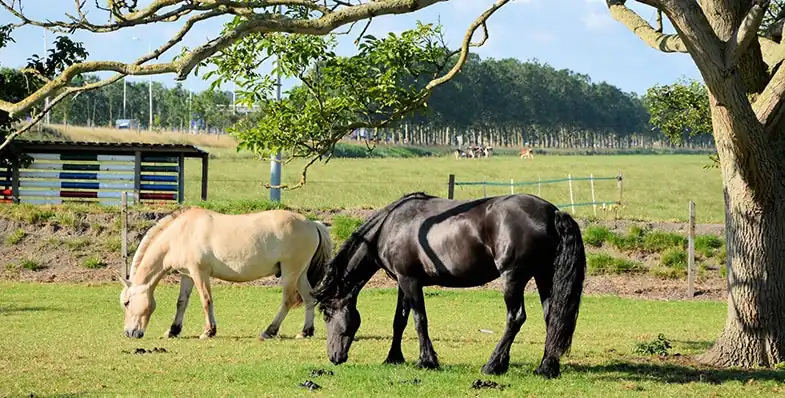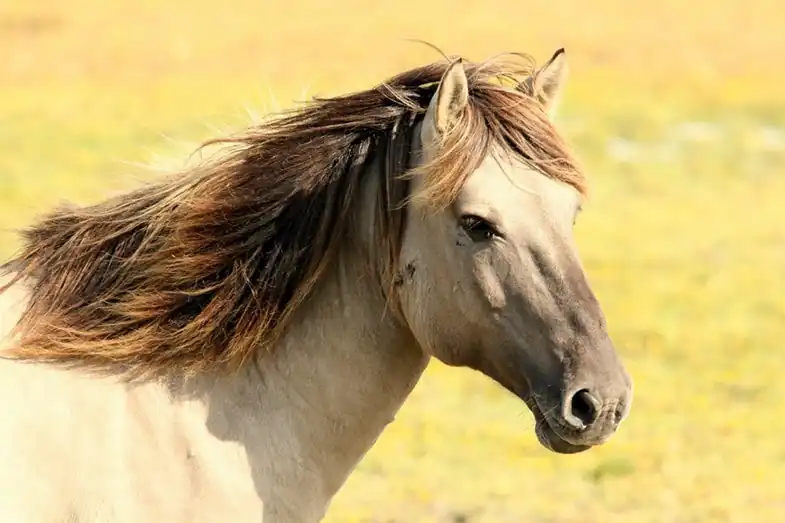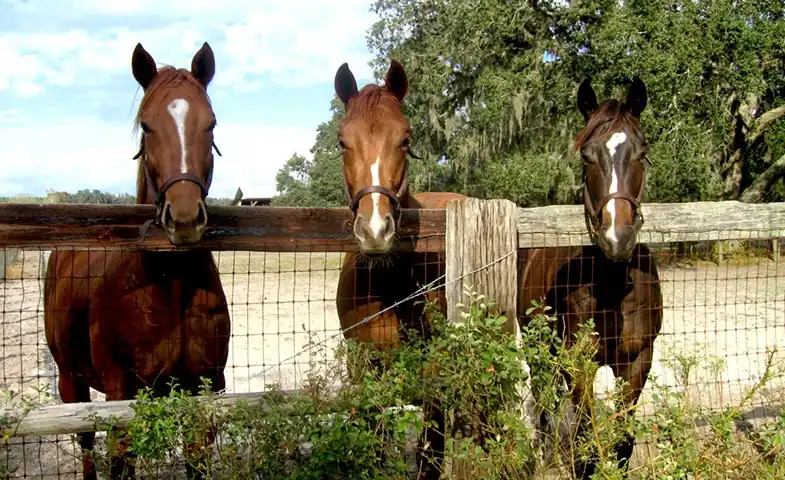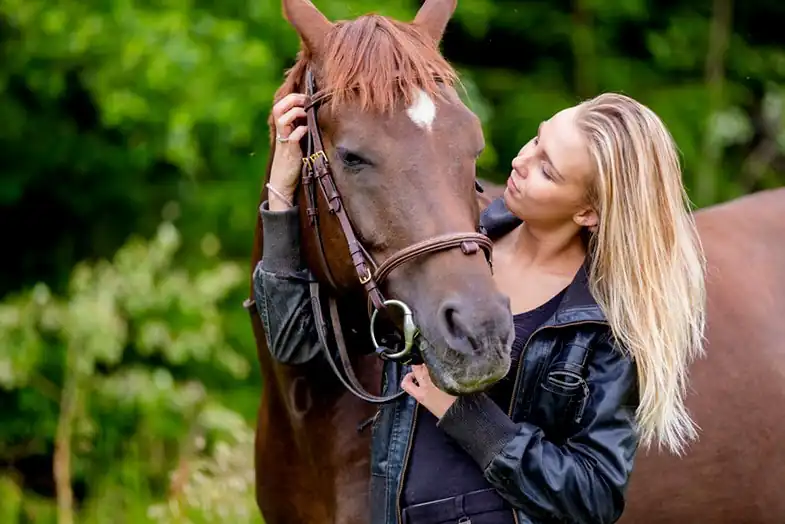Everybody is scared of something (whether they’ll admit it or not) and when you consider that approximately 8% of people in the world are scared of some sort of animal it’s easy to see that being scared of horses is not uncommon. While to horsey people that may sound strange it is a real fear that can be overwhelming to the people that are scared of them. The good news though is that with a bit of patience anybody can overcome any phobia.
How do you overcome your fear of horses? Be patient, positive, and slowly expose yourself to horses and in time you’ll learn to understand and respect them. This knowledge will greatly help you to beat that fear and even love horses.
As a rule, most people don’t confront their fears and instead are more likely to completely avoid being in a situation where they may have to face them. All fear (or phobia) is irrational, regardless of what it is you’re scared, of but confronting that fear and choosing to do something about it is, to some extent, the hardest part of ridding yourself of that fear and equinophobia (the fear of all equines including horses, ponies, donkeys, and even zebras) is no different to any other fear. It takes a lot of courage to overcome something you’re frightened of because you know that the road ahead is going to be difficult and scary, so congratulations on taking that first (and hardest) step.
Understand where your fear of horses comes from
People are scared of horses for many different reasons but understanding where that fear comes from is part of the process of overcoming it. Is there one specific incident that led to you being scared of horses, did you have (or witness) a bad injury or are you daunted by their size?
Whatever triggered your fear in the first place, talking about it can really help you to not only understand how it developed in the first place but it will also help you to rationalize the fear. Both of which, in time, will help you to overcome that fear.
Don’t worry if you find it difficult to talk about your fears at first, this is natural but it can help to remind yourself of what your ultimate goal is.
Why do you want to overcome your fear of horses?
It might sound like a silly question but asking yourself what your motivation for conquering your fears is can help you to stay focus and achieve your goals. Maybe you want to help your partner look after their horses, or your kids are pestering you to learn to ride or you’ve simply decided that you want to be able to walk past some horses without worrying about what might happen.
Writing your motivation down and pinning it in a prominent place (such as sticking it to your computer screen or on the refrigerator door) will help to keep your mind focused and will act as encouragement every time you see it.
Set yourself small goals
While the ultimate goal is to feel comfortable and relaxed around horses, regardless of whether they’re loose in the pasture or you’re in a stall with them, it can be really helpful to set yourself small manageable goals.
It can be difficult to lose heart when you think you’ve got a mountain to climb but instead of thinking about the whole mountain, it’s better to break it down into smaller checkpoints and reward yourself when you get to each of them. This will help you to keep track of your progress but will also help to keep you motivated when you think you’re not making good progress.
Depending on how scared you are of horses you could set goals such as being in the vicinity of horses, stroking them, feeding them, etc. The more goals you have the better motivated you’ll be because you’ll have a tangible way of measuring your progress.
It can also be helpful to have a scoring system where you rate how frightened you are in different situations, with 10 being absolutely petrified to 0 being completely at ease. While I’ve never been scared of horses I did have a crippling phobia of insects when I was younger and using a scoring system along with setting smaller goals really helped me to overcome my fears.
Be patient and positive
Everybody is different so there’s no set time frame for how long it takes to overcome a fear which can make it difficult to stay positive, especially when you don’t know when that’ll happen but staying positive and being patient will really help.
Thinking constructive thoughts and repeating them to yourself (either in your head or out loud) can help to keep you positive. Science has proven that thinking positive thoughts will greatly boost your mental state which will help you to relax and therefore reduce your fear and anxiety. As Andrew Clements (the best-selling author of Frindle) once said ‘fear doesn’t need doors and windows. It works from the inside’ and while fear comes from within, so does the ability to overcome it so be positive and you’ll do just fine.
While staying positive is essential it’s just as important that you’re patient and don’t try to do everything in one day. Instead, take your time and only move to the next step when you’re completely ready, not doing so can do more harm than good and set you back.
Focus on your breathing instead of running
Our bodies are programmed to respond to anything that could be potentially dangerous by either running away or staying and fighting, this response, which all animals have, is known as fight or flight and is what has helped us to stay alive in the past. The problem with fears and phobias though is that the brain tricks our bodies into thinking that there is something that could be dangerous so readies our body to run away. By giving in to this and turning away from your fear will reinforce that thought and next time your brain will remember that and think that you’re in danger again.
While it can be extremely difficult to stand face to face with your fears focusing on your breathing will help to lower your heart rate, reduce your anxiety and to some extent reprogram your brain so that your fears start to ease.
Desensitize yourself to horses
Overcoming any phobia should be done slowly and conquering your fear of horses is no different which is why you should start by desensitizing yourself to horses.
The best way of doing this is to do something that makes you feel slightly uncomfortable, I hated insects so much that I couldn’t even look at a picture of one in a book. I started by opening a book slightly so that I could see the picture clearly, I’d then look at it for a while (until I started to feel less panicky) then I’d close the book. If you don’t feel comfortable doing this then start by asking a friend to stand at a comfortable distance from you while holding a picture of a horse.
How you choose to desensitize will depend on how frightened you are but looking at photographs, watching videos, or even looking at horses from a car can all help you. How ever you choose to do it don’t back out until your heart rate has lowered and you feel more relaxed.
Learn about horses
Fear of the unknown can be a real catalyst for phobias sometimes, after all, if you don’t understand something how can you know there is nothing to be scared of? And, of course, if you don’t understand a horse’s behavior it’s easy to imagine how dangerous these massive creatures can be.
Take your time to learn about horses, how do they communicate, what is their behavior like, and even what their nature is like. By understanding how horses think and perceive the world (as well as how they react to it) will help you to understand that despite their size they are gentle creatures.
Go and visit some horses
While desensitizing yourself to pictures of horses, reading about them, and watching videos will really help there’s only so much that they can do, there’s nothing like actually seeing horses up close and personal. This is where the next stage comes in, when you’re ready and have started to desensitize yourself to horses, as well as begun to understand them a little it’s time to go and visit some, at a safe and comfortable distance of course.
When you do go to see the horses it’s vital that, whatever you do, you don’t panic if you start to feel overwhelmed, instead stay where you are and take deep breaths, this will help you to relax. When you start to feel less anxious you can leave, or stay if you’d prefer to. Fear is part of our fight or flight instinct and if you choose the flight option (by running) you’ll be psychologically backing up your fear which will make it harder to overcome. This is why it’s important not to run, but wait until your anxiety eases – next time it will be easier.
Some people find it easier to go with a friend, but if you do make sure you approach the horses on your own. You might think that it doesn’t matter but if you always visit horses with a friend you run the risk of using them as a kind of crutch, meaning that you will only be able to visit horses if somebody is with you.
Each time you visit the horses try and get a little bit closer, the more you do this the quicker you’ll be able to overcome your fear because you’ll be conditioning your brain to react positively towards horses. Eventually, you should be able to calmly walk up to them and even stroke them!
Not sure how to walk up to a horse? How to safely approach and pet a horse.
Spend time with horses
Once you’re comfortable looking at horses and stroking them, albeit with a fence in between you and them, it’s time to take it up a gear and spend a while in the presence of horses. It doesn’t matter how you do this, whether it’s going to a show or helping a friend at the barn.
The more time you spend around horses the more relaxed you’ll become, and the more relaxed you are the more the horses will be too, this means you’ll both be feeding off of each other and helping each other to relax and feel at ease.
Now that you’ve overcome your fear of horses…
First of all congratulations, you’ve now successfully overcome your fear of horses which is something you should be extremely proud of. What you do now is entirely up to you, you may want to learn to ride, own your own horse or just help out at the local barn.
If you want to learn to ride (or get back into the saddle then you may fine these articles helpful:
- Learn to ride in 12 steps
- Core exercises for equestrians
- Getting back into the saddle
- Am I too old to learn to ride?
If you’re looking to own your own horse then you might be interested in these articles:
- How to find the right horse for you
- Caring for your new horse
- I’ve just bought a horse, now what?
- Keeping a horse in your backyard
Related questions
How do I overcome my fear of horse riding?
Most people that are scared of riding are worried that they might fall off and hurt themselves. While this of course is a possibility wearing protective clothing such as a riding helmet, body protector, sensible boots and even riding gloves can help to reduce your chance of injury should you fall.
How can you tell if a horse is frightened?
When a horse is frightened they’ll pin their ears right back against their necks and open their eyes wide, they may also swoosh their tail sharply downwards, almost making a snapping sound. This is a horse’s way of letting you know he’s unhappy or frightened about something.
I hope you found this article helpful. If you did I’d be grateful if you could share it please as it would really help me.
Recommended products
Over the years I have tried hundreds of different horsey products, from various blankets and halters to different treats. Some I’ve loved, others I’ve hated but I thought I’d share with you my top all-time favorite products, the ones I never leave the yard without. I’ve included links to the products (which are in no particular order) that I really think are great.
- Horse Knots by Reference Ready – If you’re like me and enjoy pocket reference guides then you’ll love this knot tying guide. These handy cards can easily fit in your pocket or attach to the saddle for quick reference. They’re waterproof, durable and are color coded to make them easy to follow.
- Mane ’n Tail Detangler – Even if you never show your horse you’ll need to detangle his tail from time to time (and possibly his mane too) which is always a challenging chore! I’ve found that if I run a little bit of detangler through my horse’s tails every few days it stops them from getting matted up and makes combing them easy, even if they’re coated in mud. I don’t know if I should admit to this or not but it also works wonders on my hair.
- TAKEKIT Pro clippers – Over the years I’ve tried a lot of different clippers and while some were obviously better than others I found these to be by far the best. They are heavier than a lot of other clippers but for me, that’s a good thing, it makes them feel more sturdy and hardwearing. On top of that they have a range of speeds so are just as good for clipping your horse’s back as they are his face. I also like the fact that they come in a handy carry case but that’s not for everybody. The company that makes them is super good and incredibly helpful too, a real bonus these days. The only thing I wasn’t keen on was the fact that it doesn’t come with any oil, but that’s not a major problem as it’s not difficult to buy lubricant.
- Shire’s ball feeder – There are so many boredom buster toys out there but I like to use these every day, regardless of whether or not my horses are bored. I find that it helps to encourage my horses to problem solve by rewarding them with treats (or pieces of fruit) but it also mimics their natural grazing behavior which helps to keep them calm and de-stressed.
- Horse safe mirror – This is a strange one that many people are surprised about but I like to put horse safe mirrors in the trailers as well as in the quarantine stalls. It helps to prevent the feeling of isolation by giving the impression of other horses being around. Being herd animals horses can get extremely stressed when they feel that they’re on their own but with these stick-on mirrors, they believe that at least one other horse is with them.
- Rectal thermometer – I know this isn’t glamourous at all but it’s vital for your horse’s well-being to be able to check their temperature and a rectal thermometer is the easiest way of doing this which is why I’ve added it to the list.
Shopping lists
I’ve also put together a few shopping lists of essential items that I’ve found helpful over the years. I’ve broken the lists down into different categories rather than put everything in one massive list 😉

